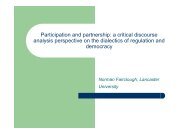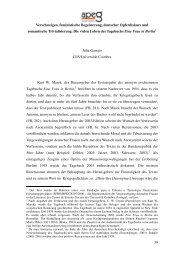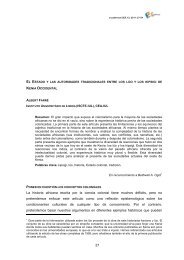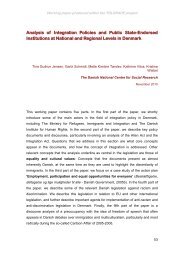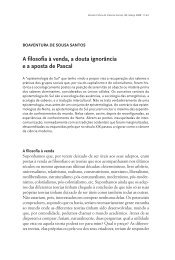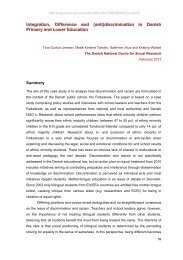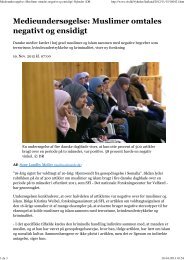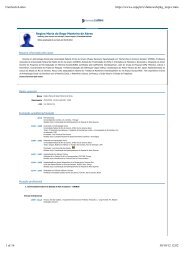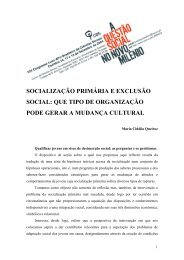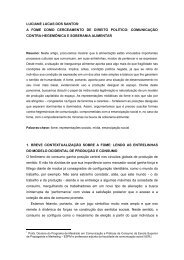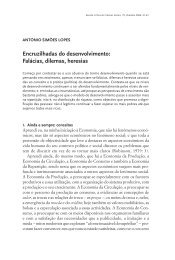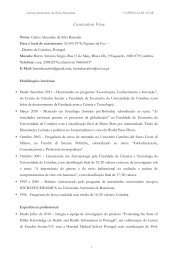The Instrumentalization of Sexual Violence in German Cold War Anti ...
The Instrumentalization of Sexual Violence in German Cold War Anti ...
The Instrumentalization of Sexual Violence in German Cold War Anti ...
Create successful ePaper yourself
Turn your PDF publications into a flip-book with our unique Google optimized e-Paper software.
RCCS Annual Review, 5, October 2013<br />
<strong>The</strong> <strong>Instrumentalization</strong> <strong>of</strong> <strong>Sexual</strong> <strong>Violence</strong> <strong>in</strong> <strong>German</strong> <strong>Cold</strong> <strong>War</strong> <strong>Anti</strong>-Communist Discourses<br />
<strong>in</strong>corporation <strong>of</strong> the memory <strong>of</strong> the lost East <strong>in</strong>to the national identity, good <strong>of</strong>ficial relations<br />
with the leagues and support for their cultural activities. No doubt political leaders knew<br />
that there was no turn<strong>in</strong>g back: with the sign<strong>in</strong>g <strong>of</strong> the Potsdam Agreement on 2 August<br />
1945, the Western Allies had sanctioned the redraw<strong>in</strong>g <strong>of</strong> borders and population transfer as<br />
a way <strong>of</strong> prevent<strong>in</strong>g tensions <strong>in</strong> the future. Government policies to provide support to the<br />
expellees may thus be seen as a way <strong>of</strong> alleviat<strong>in</strong>g that loss. Adenauer’s famous visit to<br />
Moscow <strong>in</strong> 1955 has all the signs <strong>of</strong> this course <strong>of</strong> action. <strong>The</strong> goal <strong>of</strong> this historical trip was<br />
not to discuss borders or the return <strong>of</strong> the expellees, but rather an issue regard<strong>in</strong>g which<br />
<strong>German</strong> public op<strong>in</strong>ion felt very strongly at the time: the liberation <strong>of</strong> the <strong>German</strong> soldiers<br />
still held captive by the Soviets. As far as <strong>of</strong>ficial discourse was concerned, the success <strong>of</strong> this<br />
mission was decisive <strong>in</strong> portray<strong>in</strong>g the Federal Republic as the homeland <strong>of</strong> all <strong>German</strong>s.<br />
<strong>The</strong> purpose <strong>of</strong> the present paper is to clarify one aspect <strong>of</strong> the abovementioned seem<strong>in</strong>g<br />
contradiction between a West-oriented foreign policy and a constituency whose <strong>in</strong>terests lay<br />
to the East. Based on discourses about the mass rape <strong>of</strong> <strong>German</strong> women by Soviet soldiers 6<br />
– a key experience <strong>of</strong> flight and expulsion – I will attempt to show the way <strong>in</strong> which the<br />
memory <strong>of</strong> what the expellees went through tended to re<strong>in</strong>force the two pillars <strong>of</strong> the<br />
Federal Republic’s foreign policy <strong>in</strong> the context <strong>of</strong> the <strong>Cold</strong> <strong>War</strong>: European <strong>in</strong>tegration and<br />
the transatlantic alliance. I will use two emblematic, expulsion-related texts to analyze the<br />
way <strong>in</strong> which the image <strong>of</strong> the Soviet rapist was conducive, <strong>in</strong> that particular context, to the<br />
construction <strong>of</strong> a certa<strong>in</strong> pro-European and pro-Western <strong>German</strong> identity. <strong>The</strong> first <strong>of</strong> these<br />
two works, Martyrium und Heldentum Ostdeutscher Frauen. E<strong>in</strong> Ausschnitt aus der<br />
Schlesischen Passion 1945/4 (1954) [<strong>The</strong> Martyrdom and Heroism <strong>of</strong> the Women <strong>of</strong> East<br />
<strong>German</strong>y: An excerpt from the Silesian passion, 1945-1946], was written by Johannes Kaps, a<br />
prom<strong>in</strong>ent theologian <strong>in</strong> Catholic circles and <strong>in</strong> the Bavaria-based community <strong>of</strong> expellees,<br />
who strived to raise awareness <strong>in</strong> the “Christian West” about the expulsion <strong>of</strong> <strong>German</strong>s as a<br />
result <strong>of</strong> the war. 7 <strong>The</strong> volume <strong>in</strong> question is a collection <strong>of</strong> stories <strong>of</strong> sexual violence, kill<strong>in</strong>gs<br />
6 For studies on sexual violence perpetrated by the Soviet Army aga<strong>in</strong>st <strong>German</strong> women, see, among others,<br />
Naimark (1995) and von Münch (2009).<br />
7 Johannes Kaps (Breslau, 1906 – Munich, 1959) came from a Catholic family and was orda<strong>in</strong>ed priest <strong>in</strong> 1935.<br />
In 1939, shortly after the outbreak <strong>of</strong> World <strong>War</strong> II, he returned to Breslau. Accord<strong>in</strong>g to Hans-Ludwig Abmeier,<br />
Kaps seems to have devoted himself to the cause <strong>of</strong> the release <strong>of</strong> persecuted priests and aga<strong>in</strong>st the<br />
deportation <strong>of</strong> Jews and “cross-breeds” (but Abmeier adds that, because <strong>of</strong> the destruction <strong>of</strong> war, there are<br />
very few documents to confirm it). A witness <strong>of</strong> the capitulation <strong>of</strong> Breslau on 6 May 1945, Kaps gave testimony<br />
<strong>of</strong> the atrocities committed aga<strong>in</strong>st the <strong>German</strong> population. In August 1945 he left the city and took refuge <strong>in</strong><br />
the West, giv<strong>in</strong>g an account <strong>of</strong> the conditions <strong>of</strong> extreme deprivation <strong>of</strong> the <strong>German</strong> population <strong>of</strong> Silesia, after<br />
48



